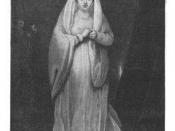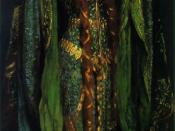In the Shakespearean "play Macbeth," all of the senses of the word "hand" come into play; and signify the magnitude and horror of actions by Macbeth and Lady Macbeth in three specific scenes evoking the theme of guilt, hands also represent your heart's intentions and finally aide in evoking a moral message for the readers while intensifying the plot with foreshadowing future events. Throughout, the entire play, the word play on hands at times changes into many different human experiences.
Macbeth and Lady Macbeth both have scenes in which they are transfixed by the sight of blood on their hands. The first incidence in which Macbeth says "Is this a dagger which I see before me, The handle toward my hand? Come, let me clutch thee." (2.1.33-34.) The bloody imaginary dagger which he sees before his hand is symbolic of Macbeth feeling guilty even before he kills Duncan. Macbeth imagines that his hands are so stained with blood signifying his guilt, that not even a ocean could wash his hands clean but that his hands would stain the water with his blood, until everything he touched became as guilty as he was.
The play on the word "hands" show that Macbeth feels guilty and is aware of what he is doing is wrong. He is aware that he is guilty of an unforgivable act and that there is no way he can change this. Macbeth and Lady Macbeth have actually committed a horrendous crime and now they are faced with the reality of the consequences of his crime. Lady Macbeth's scene with the bloody hands also signifies guilt. "Here's the smell of the blood still. All the perfumes of Arabia will not sweeten this little hand." (5.1.53-55) All these scenes in which both main characters are transfixed by the sight of blood on their hands represents their guilt that lies on their hands and can not be washed away. Shakespeare cleverly takes us into the minds of the characters through this word play of "hands" The play of the "word" hand throughout the play signifies true heart's intentions. Throughout many scenes in the play characters are said to uncover their true intentions by their hands. Lady Macbeth repeatedly tells her husband to appear to be something he isn't. Also in many instances the characters look at their hands to realize what actually is going on and the consequences of their deeds. Therefore, signifying that in the beginning of the novel Macbeth true intentions weren't evil but they transgressed into a dark trap he fell into by committing evil crimes with his hands and never being able to cleanse his hands again. He means that he wishes his eyes not to see what his hand wants to do because his hands signify his true heart's ambitious desire of being the king but first murdering Duncan.
The play on the word "hands" also aides in the moral message of the play to not fall into a pool of darkness. Since the play was written during Elizabethan times in which to be named King you were appointed by God. When you killed a king you went against God and sided with evil so it is almost like Macbeth commits cardinal sin. It is so bad that he will never be able to clean his hands of the blood, more symbolically cleanse himself of the guilt and have a clear conscience. If he even tried to clean his hands there would be so much blood that it would turn the oceans red with blood of the King. "Will all great Neptune's oceans wash this blood Clean from my hand? No; this my hand will rather the multitudinous seas incarnadine, Making the green one red." (II, II, 77-80). Now Macbeth must suffer the consequences of having fallen into a pool of darkness which he can't come out of. Thus, the play on the word "hand" evokes a moral message of not getting caught up in a pool of blood and darkness. Thus, the play gives one the reader a moral message of being careful of deeds that one does because one doesn't want to fall into a trap of darkness.
In conclusion, there are many more instances in which "hands" evoke the theme of guilt. Also "hands" is used figuratively also and add to the form of Shakespeare play and I would have liked to include that. I would also have included that hands is used 32 times in the text in total. I would have used how hands are described as being associated with many other experiences such as "walk hand-in-hand," are "caught red-handed," "give a helping hand," have a "hand on the throttle," fear someone's "God's heavy hand," and so on.
Works Cited Freud, Sigmund. Shakespeare: Macbeth- Freud on the Macbeths 11 March 2001 http://web.signnet.com.sg/~yisheng/notes/shakesspeare/mbeth-f.htm Weller, Philip. Macbeth Navigator. 2000 http://www.clicknotes.com/macbeth/welcome.html





